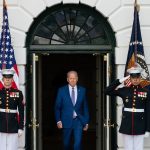Vice President Kamala Harris recently sat down for an interview with Oprah Winfrey, a pairing that could only be described as a match made in liberal heaven. It’s a dynamic duo that has many conservatives scratching their heads and asking if “The Oprah Effect” has any limits when it comes to political legitimacy. Harris was there to discuss a range of topics, from her achievements to the state of the nation, though the real attraction for many was the opportunity to see how many platitudes could possibly fit into a single conversation.
As expected, Harris brought her usual blend of vague assurance and inspirational rhetoric to the table, typical of a politician looking to sell sunshine while clouds loom on the horizon. While some may have found her words comforting, many viewers likely noticed the distinct lack of meaningful substance. Instead of tackling the real issues facing Americans, such as skyrocketing inflation and crime waves in major cities, Harris chose to focus on feel-good topics more suited to a daytime talk show than the office of the Vice Presidency.
Readers of the New York Post had their own tastier takes on the interview. Many expressed disbelief at Harris’s ability to dodge pressing questions with a skill usually reserved for professional politicians. One could almost picture her wading through questions while tossing out a whimsical anecdote or a manufactured statistic, all with a smile that appeared slightly rehearsed. The fact that this was an Oprah interview signified that the real inquiries on serious matters would be conveniently sidestepped, leaving the audience craving substance that never came.
Kamala Harris tells Oprah “if somebody breaks into my house, they’re getting shot”:
“Probably shouldn’t have said that”
— Pop Base (@PopBase) September 20, 2024
Commentators pointed out that while the interview was filled with platitudes, it lacked the hard-hitting questioning one might expect from a serious journalist. Oprah’s brand of questioning—more akin to a warm coffee chat than a political interrogation—served up a cozy atmosphere that had more in common with a book club discussion than a policy debate. Harris was given a platform, and she exploited it to charm viewers rather than confront the responsibilities of her role. It was less of a chance to hold her accountable and more of a promotional spot for the administration’s latest talking points.
In true Harris fashion, the interview ended with her leaving a whimsical note about optimism and hope for the future, which, given the current state of affairs in America, could easily be mistaken for denial. For conservatives, it’s the kind of performance that raises alarm bells: while Harris is busy spreading warmth and cheer, it feels as though they are getting left in the cold. If this is the future of political discourse, it’s no wonder that many are yearning for accountability and reason instead of the never-ending parade of feel-good narratives. The administration might want to reconsider whether it’s time to step away from the couch and start addressing the hard-hitting issues facing everyday Americans.




